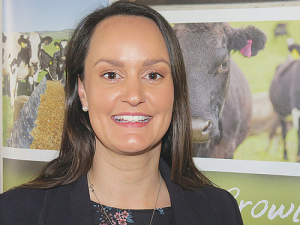Fonterra’s exit from Australia ‘a major event’
Fonterra’s impending exit from the Australian dairy industry is a major event but the story doesn’t change too much for farmers.
 Rabobank’s Emma Higgins believes the recent drop in the GDT comes from the threatened US / China trade war.
Rabobank’s Emma Higgins believes the recent drop in the GDT comes from the threatened US / China trade war.
A weaker New Zealand dollar may help offset the decline in Global Dairy Trade prices, but the reasons behind the lower dollar are more significant to dairy, says Rabobank dairy analyst Emma Higgins.
Both she and ASB’s senior economist Nathan Penny say ongoing trade friction and the growing US-China trade war contributed to last week’s GDT Event result.
That result, where the average price index slid 5% to US$3232/tonne was “ugly”, says BNZ senior economist Doug Steel. Whole milk powder (WMP) took the biggest decline with a drop of 7.3% to US$2905/t.
Higgins says this decline coincides with Fonterra’s announcement of May 2018 collections, which were up almost 7% for the month. And Fonterra has re-affirmed its “ambitious” expectations for 1.3% growth in milk production this season, to 1525 million kgMS.
According to Fonterra’s Global Dairy Update, milk collection across NZ for the 2017-18 season reached 1505m kgMS -- 1% behind the 2016-17 season.
Difficult weather was the prevailing theme last season season. However, collections for the last month of the season – May – reached 71m kgMS, 7% above the same month last season on the back of favourable autumn conditions in most regions.
Higgins says the weaker Kiwi dollar seen since the announcement of opening forecasts may help to offset the decline in prices, although individual company FX hedging policies may limit the benefit. But the reasons behind it are more worrying.
“Clearly, the ongoing trade frictions are having an impact on sentiment and therefore prices in the latest GDT Event,” she says.
Geopolitical volatility continues. The next round of trade war implications looked set to play out late last week, with the introduction of new trade tariffs by China and Mexico likely to be imposed on the US from July 6.
ASB’s Penny says the dairy auction price fall reflects nervousness stemming from increased trade tension between the US and China. Ironically the increased Chinese tariffs on US exports will actually make NZ products cheaper by comparison.
“For now though, dairy buyers are more nervous about the fallout from the increasing trade tensions and the potential impact this could have on dairy demand.”
Currencies for key dairy buyers have fallen: the Chinese yuan is down about 3% since the last auction and Chinese stock markets have been hit.
BNZ’s Steel points out that while WMP fell 7.3% at last week’s auction, longer dated prices fell by at least 11%.
“These are material declines and bigger falls than was anticipated on the day -- an ugly result,” he says. Prices are nearly 9% lower than a year ago.
“It is also important to note that the NZD has weakened over recent weeks, offering support to prices expressed in NZ dollars – the ones that matter for milk price. NZD/USD was down more than 2% since the previous mid-June auction, taking the edge off the drop in international prices,” he notes.
The RBNZ included lower dairy prices in its May monetary policy statement, but with WMP at an average of US$2905/t, prices have dipped below the RBNZ’s medium term view of US$3000/t.
News that Fonterra milk collections were up 6.6% year on year in May shouldn’t have surprised anyone, says Steel. But coupled with product volume picking up seasonally on the auction platform – up 22% on last auction -- the strong milk growth headline may have checked some buyers’ enthusiasm, Steel says.
Other factors may have been the EU continuing to unwind its massive stockpile of skim milk powder, India re-entering the world market and renewed weakness in international grain prices.
Meanwhile, some growth concerns in China and a softer Chinese yuan may have curbed Chinese demand.
“There appeared no sign of extra Chinese demand for NZ or EU product as a result of the prospect at week’s end of higher Chinese tariffs on US product (in retaliation to US tariff threats).”
BNZ is sticking with its $6.60/kgMS forecast, but with the risk tilted to the downside.
“It is worth noting that prices often drop in June and July on seasonal grounds so we wouldn’t over-react to one auction result especially with recent signs that global milk supply growth has been generally underwhelming,” Steel says.
Voting has started for the renewal of DairyNZ's milksolids levy.
The most successful catchment groups in NZ are those that have 'a source to sea' approach.
Associate Agriculture Minister and Manawatu dairy farmer Andrew Hoggard says the free trade agreement (FTA) negotiated with India is not a bad deal and his party, Act, will support it when it goes before Parliament.
Newly released data from Environment Canterbury (ECan) Farm Environment Plan (FEP) audits are showing a dramatic lift in environmental performance across the region.
A solid recovery of global dairy prices this year makes a $9.50/kgMS milk price almost a shoo-in for this season.
As New Zealand marks the United Nations’ International Year of the Woman Farmer 2026 (IYWF 2026), industry leaders are challenging the misconception that women only support farming.

OPINION: Here w go: the election date is set for November 7 and the politicians are out of the gate…
OPINION: ECan data was released a few days ago showing Canterbury farmers have made “giant strides on environmental performance”.